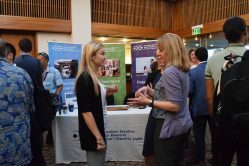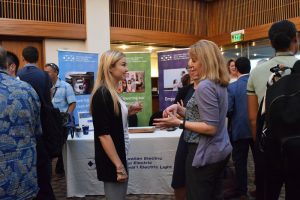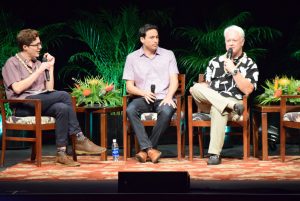
Maui Energy Conference is now the Hawaii Energy Conference
The Maui Energy Conference returns to the Maui Arts Cultural Center March 27-28, 2019 with a new name.
Maui Economic Development Board announced today that the conference would be renamed the Hawaii Energy Conference (HEC) to reflect what it has always been–the premier Energy Conference in Hawaii focused on statewide interests as seen through the prism of national and international developments in energy.

The Hawaii Energy Conference offers ample time for networking and connecting with energy industry leaders.
In its 6th year, the conference is presented by the Maui Economic Development Board (MEDB) and supported by the County Of Maui Office of Economic Development. Hawaii is a living laboratory for the effective integration of renewable energy technology, the transformation of the regulatory environment, and the growth of potential market opportunities.
The HEC consistently attracts energy industry leaders from Hawaii, the Mainland, Japan and Europe to exchange ideas on how to better serve customers in the Islands’ rapidly changing energy environment. Participants can take advantage of the ample networking time and have access to all the business and technical talent attending.

Conference Chair Doug McLeod (right) leads Q & A with 2018 Keynote Speaker Rep. Chris Lee (center) and Gavin Bade, Utility Dive (left).
Douglas McLeod, HEC Program Committee Chair, observes, “The name change reflects the fact that we have evolved into the leading energy conference in the state. The name Hawaii Energy Conference supports our reach to a wider national and international audience, especially to new entities not familiar with Maui and/or the Maui Energy Conference.”
Frank De Rego Jr., Director of Business Development Projects at MEDB and Program Committee Vice-Chair stated, “MEDB has always been a convener of values-based conversations on the most challenging opportunities facing Maui County and the State of Hawaii. For the past six years, MEDB has presented the energy conference as a means to share our mana’o (wisdom) with others while also being receptive to new ideas and best practices from around the world. Taking the name “Hawaii Energy Conference” acknowledges that broader focus and welcome to all comers.”
This year the HEC will include discussions on Distributed Energy Resources (DER) and grid modernization, exploring how a revitalized solar industry can contribute to Hawaii’s clean energy goals.
On the regulatory front, Hawaii was the first state in the nation to institute Performance Based Regulation and other regulatory innovations. The conference will investigate how regulation aligns the interests of the utility and other stakeholders with the goals of public policy.
“We also need to talk about the interplay between Fossil and Renewable energy in the ‘real’ world,” says McLeod. “We can’t ignore the way 2/3 of our energy is used. Most goods and passengers still travel in planes and ships powered by fossil fuels. How do we reach our long term goal using the right blend of resources?”
The HEC will also tackle land use and development with its relationship to energy. Specifically, how can new housing developments be a catalyst for further clean energy gains? How do we bring together government, regulators, developers, energy producers, the utility and the community in a common cause to create a clean energy-housing construction nexus? Is it really such an outrageous idea to think we could build housing in smart connected communities that can limit future electricity demand while providing services to the grid?
“Building from the success of the Maui Energy Conference,” says De Rego. “we hope stakeholders representing the wide variety of interests in energy will join us on Maui in March for the Hawaii Energy Conference.”
